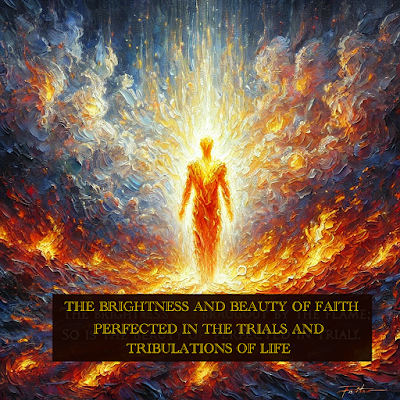Living Out God’s Purpose
Chosen for Salvation
Standing Firm in His Word
Scripture:
“But we ought always to thank God for you, brothers and sisters loved by the Lord, because God chose you as firstfruits to be saved through the sanctifying work of the Spirit and through belief in the truth. He called you to this through our gospel, that you might share in the glory of our Lord Jesus Christ. So then, brothers and sisters, stand firm and hold fast to the teachings we passed on to you, whether by word of mouth or by letter.”
—2 Thessalonians 2:13–15
The Thessalonian Community suffered primarily due to their newfound allegiance to Christ, which disrupted the social and religious norms of their community. Their faith challenged the polytheistic practices of Greco-Roman culture, provoking hostility from both pagan neighbors and local authorities. Many faced ostracism, ridicule, and loss of status or livelihood.
Additionally, they endured pressure from the Jewish community, who opposed the message of Jesus as the Messiah and often stirred unrest against early Christians (Acts 17:5-9). Some believers may have been falsely accused, fined, or even physically harmed. Despite these hardships, Paul urged them to see their persecution as evidence of their faithfulness and their unity with Christ’s own suffering.
God’s Work of Salvation and Sanctification
This passage reminds us that salvation and sanctification are central to the Christian journey. Salvation is the act of God rescuing us from sin and its consequences, granting us eternal life through faith in Jesus Christ. It begins with God’s sovereign choice and is sustained by His grace, not our merit.
Sanctification, on the other hand, is the ongoing process by which the Holy Spirit transforms us into the likeness of Christ. N.T. Wright explains, “The Spirit’s sanctifying work is not simply about personal transformation but about shaping a community that reflects the character of Christ in a world that opposes Him.”
Charles Spurgeon emphasizes its inward nature: “Sanctification is not merely a work done for us; it is a work done in us. It is God’s Spirit transforming our very nature to make us like Christ.”
Together, salvation and sanctification reveal God’s plan to redeem us, refine us, and ultimately glorify us in Christ.
Standing Firm Amid Trials
The Thessalonians faced trouble rather than peace for their faith, yet Paul encouraged them by connecting their persecution to a long heritage of faithful saints who endured suffering for their devotion to God.
The prophets serve as prime examples. Elijah fled from Queen Jezebel’s threats (1 Kings 19:1-3), and Jeremiah faced mockery and imprisonment for proclaiming God’s truth (Jeremiah 20:7-9; 37:15). Despite the opposition, their unwavering faith inspired generations to follow. John the Baptist, another example, was imprisoned and executed for boldly confronting Herod’s sin (Matthew 14:1-12), yet he remained faithful in preparing the way for Christ. Stephen, the first Christian martyr, fearlessly proclaimed the gospel despite violent opposition. He was stoned to death, praying for his persecutors as he surrendered his life (Acts 7:54-60).
William Barclay notes that silencing the messenger does not eliminate the message. “No man ever rendered a message inoperative by slaying the messenger,” he writes, emphasizing that Christ’s truth endures despite persecution.
In such trials, Paul’s call to “stand firm” becomes vital. J.I. Packer reminds us, “To stand firm is to trust in the unshakable truth of God’s Word, even when the world seeks to undermine it.” Faithfulness in the face of opposition aligns us with this great legacy.
The Thessalonians’ story also challenges us to examine our attitudes toward God’s grace and its inclusivity. Barclay critiques those who see themselves as chosen for privilege rather than service, warning against the arrogance of exclusivity. True faith is expansive, spilling over into love for others.
Dietrich Bonhoeffer powerfully states, “The Church is only the Church when it exists for others.” Our faith must not isolate us but compel us to share God’s love and grace with the world.
Prayer Focus: Strength to Stand Firm
Paul’s exhortation invites us to reflect on God’s sanctifying work and to seek His strength to remain faithful.
• Thank God for choosing you and transforming your life through His Spirit.
• Pray for courage to stand firm in the face of trials, false teachings, and apathy.
• Ask for a heart that desires to share God’s grace with others, breaking down barriers of exclusivity.
• Commit to living out your faith as a light in a dark world, reflecting Christ’s glory.
Closing Thought
Salvation is both a gift and a calling. God has chosen us, sanctified us, and invited us to stand firm in faith while sharing His love with the world. As we hold fast to His Word, we join the ranks of those who have faithfully endured before us, confident that He will complete the work He began in us.
“The one who calls you is faithful, and He will do it” (1 Thessalonians 5:24).
Suggested Prayer
Lord, thank You for choosing me for salvation and sanctifying me by Your Spirit. Help me to stand firm in Your truth and to reflect Your grace to those around me. Strengthen me in the face of trials and empower me to live boldly for Your glory. Amen.
Now may the God of peace make you holy in every way, and may your whole spirit and soul and body be kept blameless until our Lord Jesus Christ comes again.
1 Thessalonians 5:23









